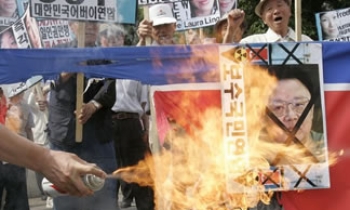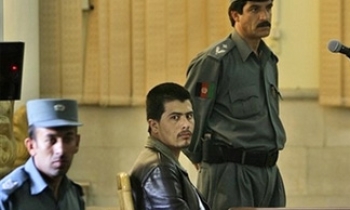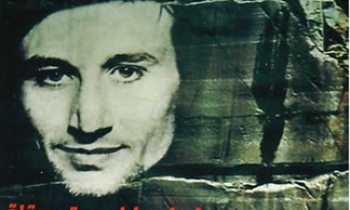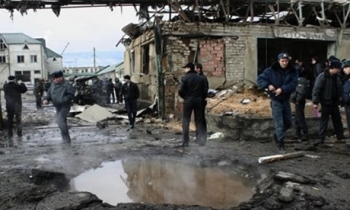Press freedom advocates around the globe observed World Press Freedom Day on May 3 � a day to remind the world of the crucial role a free press plays in strengthening democracies and fostering development. Celebrated each year since 1993, when it was proclaimed by the United Nations General Assembly, World Press Freedom Day is an occasion to pay tribute to journalists who have been killed because of their work and to promote the importance of protecting the right to freedom of expression.

As the only UN agency dedicated to promoting press freedom and freedom of expression, UNESCO organises an annual prize-giving ceremony and conference to commemorate World Press Freedom Day. This year's events were held in Colombo, Sri Lanka under the theme "Media, Development and Poverty Eradication."
UNESCO awarded Lebanese journalist May Chidiac the 2006 UNESCO/Guillermo Cano World Press Freedom Prize. The US $25,000 prize is named after Colombian journalist Guillermo Cano, who was assassinated in 1987 after denouncing the activities of powerful drug barons in his country. It honours the work of an individual or an organization that defends or promotes freedom of expression at great risk to their lives.
Chidiac, a popular television news presenter, survived an assassination attempt on September 25, 2005. She lost her left hand and leg when a bomb strapped to her car detonated minutes after she got in. She has come to be seen as a symbol of freedom of expression in Lebanon, where the assassinations of two colleagues �columnist Samir Kassir and newspaper publisher Gebran Tueni � in 2005 shocked the nation.
"Free and independent media serve as a vehicle for sharing information in order to facilitate good governance, generate opportunities to gain access to essential services, promote accountability and counteract corruption, and develop the relationship between an informed, critical and participatory citizenry and responsive elected officials," said UNESCO Director General Koïchiro Matsuura.
Matsuura noted that free and independent media are associated with a range of benefits that are highly relevant to poverty eradication, including the recognition and strengthening of basic human rights, a stronger civil society, institutional change, political transparency, support to education, public health awareness (such as education campaigns on HIV and AIDS) and sustainable livelihoods.

In a joint statement, four experts who monitor media freedom for the United Nations, the Organization of American States, the African Commission on Human and Peoples' Rights, and the Organization for Security for Cooperation in Europe said "in 2005, the world recorded the highest number of journalists and other media professionals, killed or injured in the line of duty."
The experts called on governments to "combat impunity with regard to violence against journalists and media personnel, by bringing to justice those responsible for attacks against them, and by taking measures that enable journalists and media personnel to continue providing information freely and independently."
The Committee to Protect Journalists released its list of 10 Most Censored Countries. North Korea, which CPJ said is the world's deepest information void, emerged as the most censored country in the world. Burma, Turkmenistan, Equatorial Guinea, and Libya round out the top five nations on CPJ's list. The other countries on the list are Eritrea, Cuba, Uzbekistan, Syria, and Belarus.
In issuing its report to mark World Press Freedom Day on May 3, CPJ called state-sponsored censorship one of the most urgent threats facing journalists worldwide. CPJ studied press freedom conditions in dozens of countries around the world to assess the access people have to independent information and the methods leaders use to stifle news.
Reporters sans Frontières (RSF) released its annual report and noted that 2005 was a bloody one, with at least 63 journalists and five media assistants killed worldwide and more than 1,300 media workers attacked or threatened � the highest toll since 1995, when Algerian Islamic fundamentalist groups attacked anyone who didn't support them.
Violence against journalists is now routine in Bangladesh, the Philippines, Nigeria and Mexico and it goes unpunished. A few killers of journalists were arrested and given prison sentences in 2005 but others are still walking free. Guilty policemen, soldiers, drug-traffickers, members of armed groups and criminals of all stripes are still at large and know they're safe from the law. Impunity is still the main enemy of human rights activists, RSF said.

The RSF report said, "Imprisonment is the favour weapon of authoritarian rulers to silence journalists and more than 100 currently languish in jails around the world. The picture is much the same from year to year and China, Cuba, Eritrea, Ethiopia, Iran and Burma are still the countries holding most journalists."
In these places, a sharp commentary, an over-strong adjective or an irritating news item are immediately dubbed "threats to public order," "sedition" or "undermining state security." Punishment can be five, 10 or even 20-year prison sentences, as well as cancellation of civil rights, all aimed at breaking the journalist involved and frightening others who might utter some critical or disobedient thought.
Amnesty Internation said in a statement, "It is not just in conflict situations that journalists need protection. Across the world, in a range of different situations, journalists are attacked, imprisoned and forced into self-censorship by repressive governments. The common element in all of these is the unwillingness of some governments to allow alternative voices to emerge and, in many cases, a fear that journalists will expose abuses they have tried to keep quiet."
States, Amnesty said, have a duty to protect journalists and not to persecute them in an effort to control the free flow of information. A free media is not only beneficial, but necessary in a free society. By exposing human rights abuses and giving voice to marginalised parts of the community, the media can at its best encourage the proper application of justice and stimulate debates that can defuse situations that might otherwise lead to conflict. When faced with unjust restrictions and the threat of attack, self-censorship in the media can have the opposite effect, aiding the covering up of abuses and fostering frustration in marginalised communities.
"International recognition of the importance of journalists and the need for them to work free from unjust restrictions and the threat of violence will help to put pressure on those states who seek to control the media. Journalism matters and it is time for those who recognise the importance of a free media to try to change the minds of those who do not," the human rights organisation said.
The International News Safety Institute (INSI) has launched a global inquiry into the causes of journalist deaths around the world � the first detailed, comprehensive investigation of its kind. The inquiry will produce a report and recommendations for action by the international community. It aims to finish work by the end of this year.

INSI Director Rodney Pinder said in a statement, "There is no greater threat to free societies than the murder of journalists. If journalists are not free to report others eventually go blind: governments cannot see what's going on at home or abroad, global institutions stagger and stumble, finance and business wither. The year 2005 was the worst recorded for journalist deaths worldwide. INSI counted 146 journalists and support staff � drivers, translators, fixers and others � who died doing their jobs in 28 countries."
International Press Institute (IP) Director Johann P Fritz said, "World Press Freedom Day is a day to remember that when a journalist is killed the public risks the loss of valuable information beneficial to society. The authorities must investigate these violent crimes properly and the perpetrators must be brought to justice. There should also be greater awareness of the relationship between the free flow of information and the essential work carried out by journalists."
These killings (those in 2005) have damaging consequences for societies everywhere, IPI said in a statement. "The death of a journalist can lead to the loss of reporting on important issues, such as crime and corruption, and prevent vital information from reaching the public domain. In turn, understanding of these issues can be impaired, leading to a breakdown in public discussion. The killings, when allied with impunity, also create a climate of self-censorship in which journalists avoid reporting on certain issues. The result is a information vacuum on certain subjects in countries all over the world, hindering the growth of democracy."









